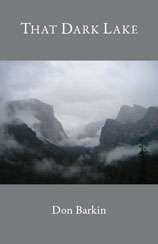|
|
|
|
||||
Click here to read a review of That Dark Lake. Click here to read sample poems. Click here to view Don Barkin’s upcoming events Click here to read ancillary material in the Seminar Room |
||||
|
BOOK STATISTICS ISBN 978-0-9817883-6-4
|
|
At School Was my dirty-faced friend Tim And me, who kept my margins straight Tim and Ann and Mrs. Bone |
|
The Descent It was all loneliness for her, And it was deep as a long-deserted quarry cornered her with talk in her kitchen, |
|
Wedding Poem In the film, they fly toward one another |
A Quiet Incident I once saw the face of God After that day my belief settled in. |
For once I didn’t talk and talk at something that I couldn’t see |
Sliding Careless of its cargo, the saucer wended Later came a tantrum over bed, |
First Dance When he can’t pick his daughter out from all in jeans and swinging ties. He thinks they’re thugs, She might be with those girls up in the bleachers, He ought to see her since like him she’s tall, |

